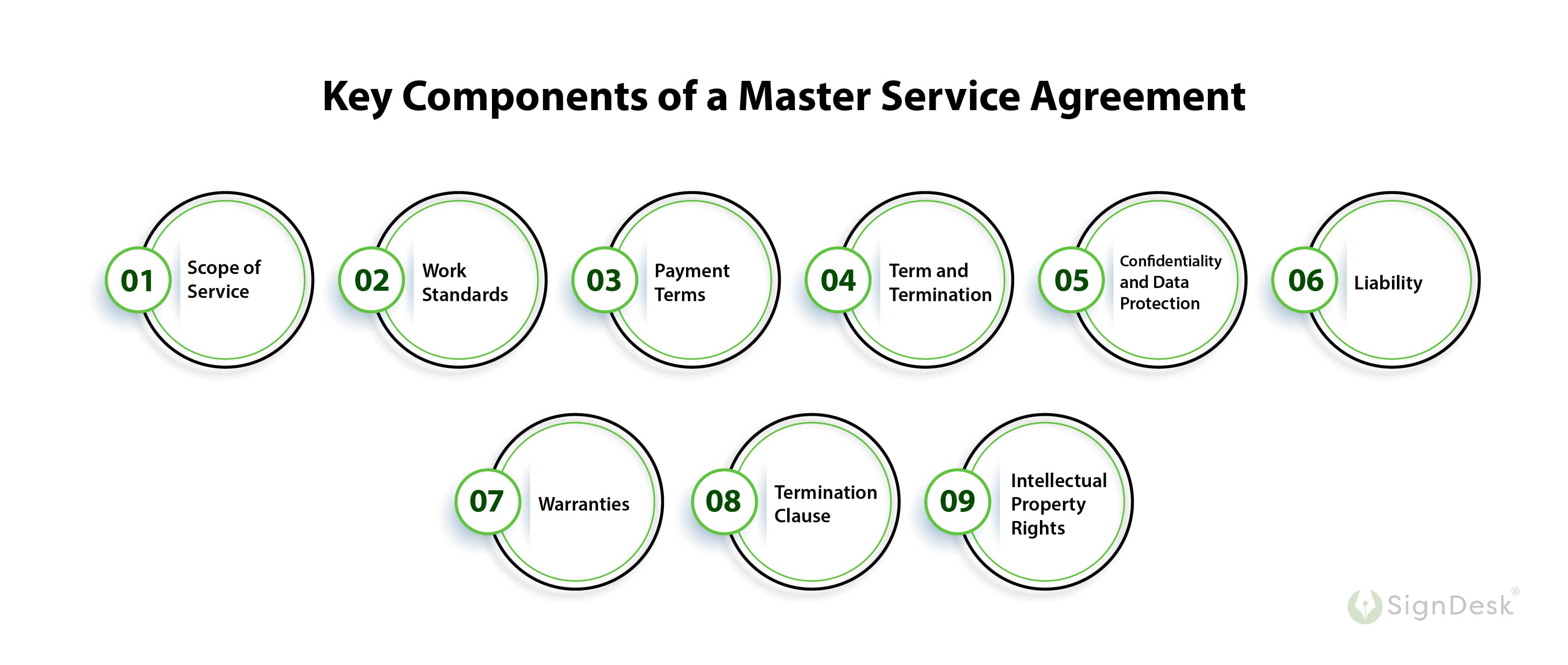What Is a Master Service Agreement?
MSA Legal Term Definition:
A Master Service Agreement, or MSA, is a legally binding contract between two or more parties that outlines the terms and conditions that govern their business relationship. It is a comprehensive document that defines the scope of work, obligations, payment terms, and expectations for all the parties involved.
Importance of MSA in Business Relationships
Master Service Agreements establish the relationship between a business and a vendor when and are crucial for any business partnership or contract. Creating an MSA allows clients and vendors to mutually agree upon the standard terms at the onset of their business relationship before projects commence.
MSAs establish the specific governing terms and conditions for a partnership, enabling organizations to focus on their contract specifics, without having to worry about their foundational agreements.
A Master Service Agreement helps businesses outline commitments, ownership rights, pricing structures, and establishes a framework for negotiating, saving them from having to re-draft contracts repetitively.
Having a MSA significantly reduces the TAT and complexity of the contract negotiation stage, which helps expedite future projects. They serve as foundational contracts for long-term business relationships by offering the flexibility to grow.
A Master Service Agreement acts as a benchmark for expectations and enables negotiations and service delivery. It provides transparency in business relationships, and acts as a safeguard against disputes.
What Does a Master Service Agreement Include?
A well-crafted MSA typically includes several key components that protect both parties’ interests and facilitate a successful partnership.
Here are the essential elements of a Master Service Agreement:
- Scope of Service: It defines the specific services that need to be performed and includes expectations, responsibilities, and deliverables. For example, an IT Master Service Agreement includes monitoring and maintenance of network infrastructure, cybersecurity and cloud services, and help desk support.
- Work Standards: This section describes the criteria for the quality of the work completed. It can include project management specifics and service level agreements (SLAs).
- Payment Terms: These include details such as rates, fees, payment structure, and payment schedule.
- Term and Termination: This section defines the duration of the agreement, including the start and end dates, along with the conditions for termination.
- Confidentiality and Data Protection: This includes the obligations of all the parties to protect the confidentiality of the sensitive information present in the agreement.
- Liability: This section includes the limitation of liability clause and outlines the extent of liability, including the types of damages covered, limitations of liability, and exclusions.
- Warranties: These are the guarantees made by the service provider to the client regarding the quality of the deliverables.
- Termination Clause: This section outlines the conditions under which either party can terminate the MSA contract.
- Intellectual Property Rights: This refers to the control and ownership of the intellectual property created during the agreement.

When Do Businesses Use Master Service Agreements?
Creating a Master Service Agreement is wise when businesses expect to work together beyond a single project or contract. An MSA will serve as the foundation for all long-term business relationships.
Businesses can use master service agreements for several situations, such as:
- Multiple Projects: When dealing with numerous projects with the same vendor or client, a Master Service Agreement contract eases the contracting process for businesses.
- Ongoing Services: Master Service Agreements are necessary for long-term service contracts.
- Complex Transactions: Master Service Agreements are helpful for business partnerships that involve intricate deals with multiple parties, projects, or deliverables.
- Renewable Contracts: Master Service Agreements are beneficial for renewable contracts to ensure continuity in the business relationship.
- International Business: MSAs provide a clear and comprehensive framework for cross-border partnerships, ensuring they are governed by consistent terms and conditions.
- Regulated Industries: Businesses operating in highly regulated industries, such as finance, healthcare, securities, and insurance, utilize Master Service Agreements to comply with regulations.
How to Create and Execute an MSA with CLM Software?
Drafting Master Service Agreements can be a time-consuming and complex process. Contract Lifecycle Management (CLM) software simplifies the process by automating the creation, execution, and management of MSAs.
Businesses can utilize CLM to create and manage their Master Service Agreements as follows:
- Use a customizable Master Service Agreement template in the Contr.act library. Enter party details like names, contact information, etc., in the dynamic fields.
- Enter the scope of services, timelines, and deliverables and customize the payment terms, termination clauses, and other fields.
- Create a clause library to insert standard clauses and ensure consistency across all MSAs within the organization.
- Collaborate virtually on the CLM platform using redlining and commenting to suggest and update the MSA.
- Establish an automated approval workflow to ensure that designated personnel review and approve the final draft of the MSA agreement.
- eStamp the approved MSA and use the integrated eSignature tool to get the MSA signed.
- Store the executed MSA in the centralized repository to enable quick access and tracking throughout the MSA’s lifecycle.
- Use CLM software’s reporting and analytics to monitor compliance, performance, and track key dates like termination and renewals.
Using CLM software enables companies to reduce manual workload and improve efficiency in their contract management process.
Manage Master Service Agreements Effectively With SignDesk
Managing Master Service Agreements effectively is crucial for maintaining client and partner relationships. Automating contract processes with SignDesk’s CLM software, helps companies reduce risks and enhance performance and efficiency.
With Contr.act, businesses can automate MSA lifecycles from end to end, with customizable contract templates, digital negotiations, low-code form builder, contract redlining automated approvals, eStamping, eSigning, centralized storage, and milestone and obligation tracking.
Book a free demo to see how Contr.act streamlines MSA management and enhances business operations.